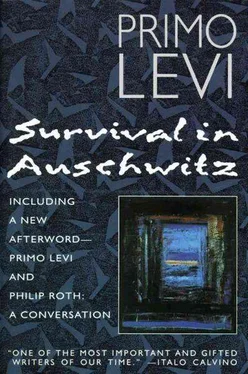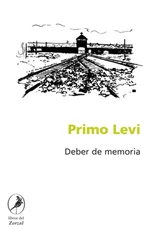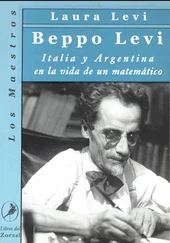The reveille is at 4 a.m., even for the patients. One has to make one’s bed and wash, but there is not much hurry and little severity. The bread is distributed at half past five, and one can cut it comfortably into thin slices and eat it lying down in complete peace; then one can fall asleep again until the soup is distributed at midday. Until about 4 p.m. it is Mittagsruhe, afternoon rest-time; then there is often the medical visit and dispensing of medicines, and one has to climb down from the bunks, take off one’s shirt and file past the doctor. The evening ration is also served in bed, after which, at 9 p.m., all the lights are turned off except for the shaded lamp of the nightguard, and there is silence.
…And for the first time since I entered the camp the reveille catches me in a deep sleep and its ringing is a return from nothingness. As the bread is distributed one can hear, far from the windows, in the dark air, the band beginning to play: the healthy comrades are leaving in squads for work.
One cannot hear the music well from Ka-Be. The beating of the big drums and the cymbals reach us continuously and monotonously, but on this weft the musical phrases weave a pattern only intermittently, according to the caprices of the wind. We all look at each other from our beds, because we all feel that this music is infernal.
The tunes are few, a dozen, the same ones every day, morning and evening: marches and popular songs dear to every German. They lie engraven on our minds and will be the last thing in Lager that we shall forget: they are the voice of the Lager, the perceptible expression of its geometrical madness, of the resolution of others to annihilate us first as men in order to kill us more slowly afterwards.
When this music plays we know that our comrades, out in the fog, are marching like automatons; their souls are dead and the music drives them, like the wind drives dead leaves, and takes the place of their wills. There is no longer any will: every beat of the drum becomes a step, a reflected contraction of exhausted muscles. The Germans have succeeded in this. They are ten thousand and they are a single grey machine; they are exactly determined; they do not think and they do not desire, they walk.
At the departure and the return march the SS are never lacking. Who could deny them their right to watch this choreography of their creation, the dance of dead men, squad after squad, leaving the fog to enter the fog? What more concrete, proof of their victory?
Even those in Ka-Be recognize this departure and return from work, the hypnosis of the interminable rhythm, which kills thought and deadens pain; they have experienced it themselves and they will experience it again. But one had to escape from the enchantment, to hear the music from outside, as happened in Ka-Be, and as we think back now after the liberation and the rebirth, without obeying it, without enduring it, to understand what it was, for what meditated reason the Germans created this monstrous rite, and why even today, when we happen to remember some of those innocent songs, our blood freezes in our veins and we become aware that to escape from Auschwitz was no small fortune.
I have two neighbours in the adjoining bunk. They lie down all day and all night, side by side, skin against skin, crossed like the Pisces of the zodiac, so that each has the feet of the other beside bis head.
One is Walter Bonn, a Dutchman, civilized and quite well mannered. He sees that I have nothing with which to cut my bread and loans me his knife, and then offers to sell it to me for half a ration of bread. I discuss the price and then turn it down, as I think that I will always find someone to lend me one here in Ka-Be, while outside it only costs a third of a ration. Walter is by no means less courteous because of this, and at midday, after eating his soup, he cleans his spoon with his mouth (which is a good rule before loaning it, so as to clean it and not to leave waste any traces of soup which may still be there) and spontaneously offers me it.
‘What are you suffering from, Walter?’
‘Körperschwäche’, organic decay. The worst disease: it cannot be cured, and it is very dangerous to enter Ka-Be with such a diagnosis. If it had not been for the oedema of his ankles (and he shows me it) which hinders him from marching to work, he would have been very cautious about reporting ill.
I still have quite confused ideas about this kind of danger. Everybody speaks about it indirectly, by allusions, and when I ask some question they look at me and fall silent.
Is it true what one hears of selections, of gas, of crematoriums?
Crematoriums. The other one, Walter’s neighbour, wakes up startled and sits up: who is talking about the crematorium? what is happening? cannot a sleeping person be left in peace? He is a Polish Jew, albino, with an emaciated and good-natured face, no longer young. His name is Schmulek, he is a smith. Walter tells him briefly.
So, ‘der Italeyner’ does not believe in selections. Schmulek wants to speak German but speaks Yiddish; I understand him with difficulty, only because he wants to be understood. He silences Walter with a sign, he will see about persuading me:
‘Show me your number: you are 174517. This numbering began eighteen months ago and applies to Auschwitz and the dependent camps. There are now ten thousand of us here at Buna-Monowitz; perhaps thirty thousand between Auschwitz and Birkenau. Wo sind die Andere? Where are the others?’
‘Perhaps transferred to other camps?’ I suggest.
Schmulek shakes his head, he turns to Walter.
‘Er will nix verstayen,’ he does not want to understand.
But destiny ordained that I was soon to understand, and at the expense of Schmulek himself. That evening the door of the hut opened, a voice shouted ‘Achtung!’ and every sound died out to give way to a leaden silence.
Two SS men enter (one of them has many chevrons, perhaps he is an officer?). One can hear their steps in the hut as if it was empty; they speak to the chief doctor, and he shows them a register, pointing here and there. The officer notes down in a book. Schmulek touches my knee :
‘Paus’ auf, paus’ auf,’ keep your eyes open.
The officer, followed by the doctor, walks around in silence, nonchalantly, between the bunks; he has a switch in his hand, and flicks at the edge of a blanket hanging down from a top bunk, the patient hurries to adjust it.
One has a yellow face; the officer pulls away his blankets, he starts back, the officer touches his belly, says, ‘Gut, gut,’ and moves on.
Now he is looking at Schmulek; he brings out the book, checks the number of the bed and the number of the tattoo. I see it all clearly from above: he has drawn a cross beside Schmulek’s number. Then he moves on.
I now look at Schmulek and behind him I see Walter’s eyes, so I ask no questions.
The day after, in place of the usual group of patients who have recovered, two distinct groups are led out. The first have been shaved and sheared and have had a shower. The second left as they are, with long hair and without being treated, without a shower. Nobody said good-bye to the latter, nobody gave them messages for healthy comrades.
Schmulek formed part of this group.
In this discreet and composed manner, without display or anger, massacre moves through the huts of Ka-Be every day, touching here and there. When Schmulek left, he gave me his spoon and knife; Walter and I avoided looking at each other and remained silent for a long time. Then Walter asked me how I manage to keep my ration of bread so long, and explained to me that he usually cuts his bread lengthwise to have longer slices in order to smear on the margarine more easily.
Читать дальше












